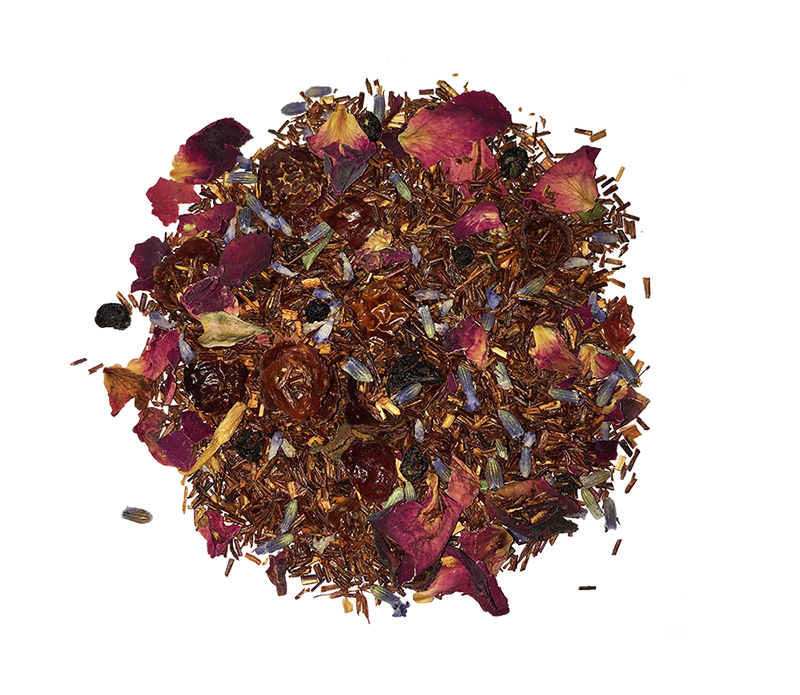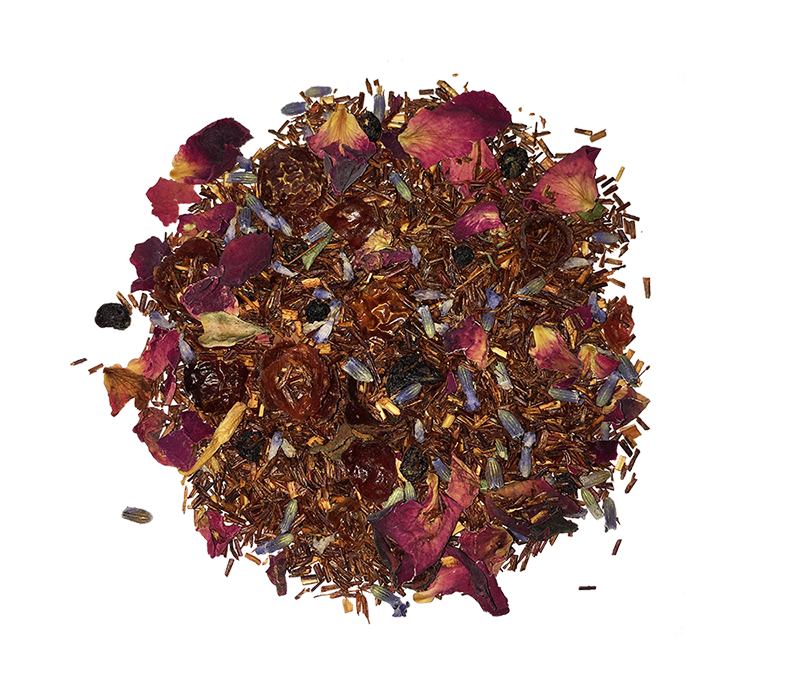Organic Garden Rooibos - 100g

Organic Garden Rooibos - 100g
$20.00
$20.00/ Case
- In stock, ready to ship
- Inventory on the way
- Vintage:
- Type: Rooibos, Oolong, White Tea
- Bottle Size: 1 x 100mL
- Bottles Per Case: 1
- Varietal:
- Country:
- Region:
Fruity with sweet floral notes create synergy with the burgundy rooibos. The lavender provides a sweet floral finish.
What makes our Organic Garden Rooibos tea particularly good for your belly is a unique and powerful flavonoid called Aspalathin. According to South African researchers, polyphenols and flavonoids found in the plant inhibit adipogenesis–the formation of new fat cells–by as much as 22 percent. The chemicals also help aid fat metabolism. As an added bonus, Rooibos is naturally sweet, so you won't need to add sugar.
The Romans first recognized the herb lavender: it was infused in their bath water and its name is derived from lava, meaning ‘to wash’. Lavender is grown extensively in Southern France, principally in Provence and if you are lucky enough to tour Provence you will find evidence of the Romans, as there are many archaeological sites of Roman ruins. The story of Rooibos on the other hand starts around 1900 in South Africa’s beautiful Cedarberg region. It was the locals of the area who first discovered that the fine needle like leaves of the wild “Aspalathus Linearis” plant made a tasty aromatic tea and it was they who first harvested the plants, chopped them with axes and bruised them with hammers leaving them to ferment before drying in the sun. Cedarburg’s microclimate and coarse sandy soil are perfectly suited to this unique species of plant. Unique plants around the world are often only found in certain areas and it is only in South Africa’s Cape Province that rooibos grows in its natural state. Today of course, rooibos is cultivated rather than collected from the wild and due to demand; plantations are starting up in other areas of South Africa. Rooibos is an herb that contains no caffeine and those that consume Rooibos have claimed that it has a soothing effect on headaches, disturbed sleeping patterns and digestive problems.
Rooibos seeds are planted in February and March and tended for 18 months after which they are harvested. Cut Rooibos is bound and milled to a uniform length then bruised between rollers to trigger the fermentation process, which results in the characteristic flavor and sweet aroma.
What makes our Organic Garden Rooibos tea particularly good for your belly is a unique and powerful flavonoid called Aspalathin. According to South African researchers, polyphenols and flavonoids found in the plant inhibit adipogenesis–the formation of new fat cells–by as much as 22 percent. The chemicals also help aid fat metabolism. As an added bonus, Rooibos is naturally sweet, so you won't need to add sugar.
The Romans first recognized the herb lavender: it was infused in their bath water and its name is derived from lava, meaning ‘to wash’. Lavender is grown extensively in Southern France, principally in Provence and if you are lucky enough to tour Provence you will find evidence of the Romans, as there are many archaeological sites of Roman ruins. The story of Rooibos on the other hand starts around 1900 in South Africa’s beautiful Cedarberg region. It was the locals of the area who first discovered that the fine needle like leaves of the wild “Aspalathus Linearis” plant made a tasty aromatic tea and it was they who first harvested the plants, chopped them with axes and bruised them with hammers leaving them to ferment before drying in the sun. Cedarburg’s microclimate and coarse sandy soil are perfectly suited to this unique species of plant. Unique plants around the world are often only found in certain areas and it is only in South Africa’s Cape Province that rooibos grows in its natural state. Today of course, rooibos is cultivated rather than collected from the wild and due to demand; plantations are starting up in other areas of South Africa. Rooibos is an herb that contains no caffeine and those that consume Rooibos have claimed that it has a soothing effect on headaches, disturbed sleeping patterns and digestive problems.
Rooibos seeds are planted in February and March and tended for 18 months after which they are harvested. Cut Rooibos is bound and milled to a uniform length then bruised between rollers to trigger the fermentation process, which results in the characteristic flavor and sweet aroma.
- Door-To-Door Shipping Within Ontario




